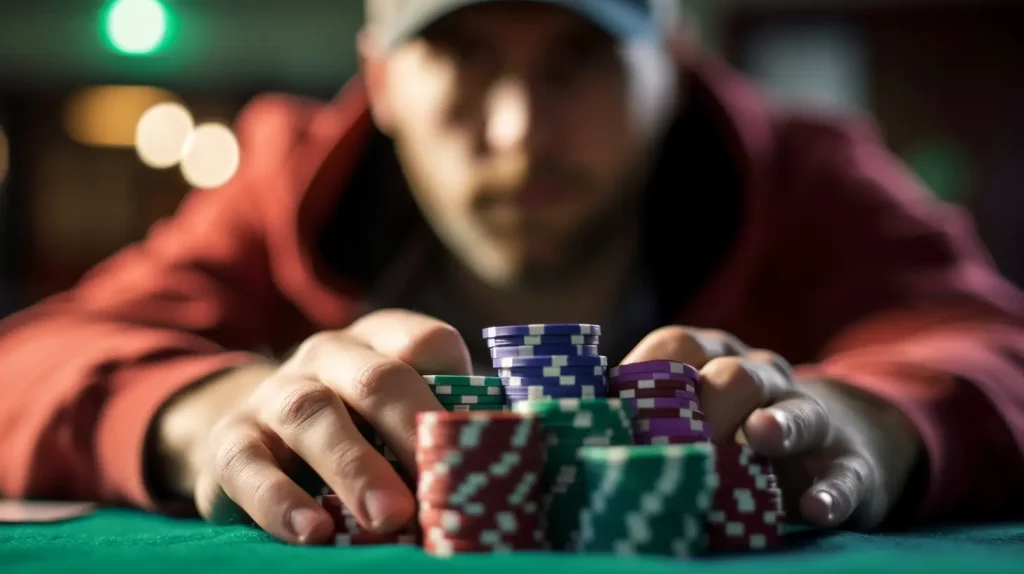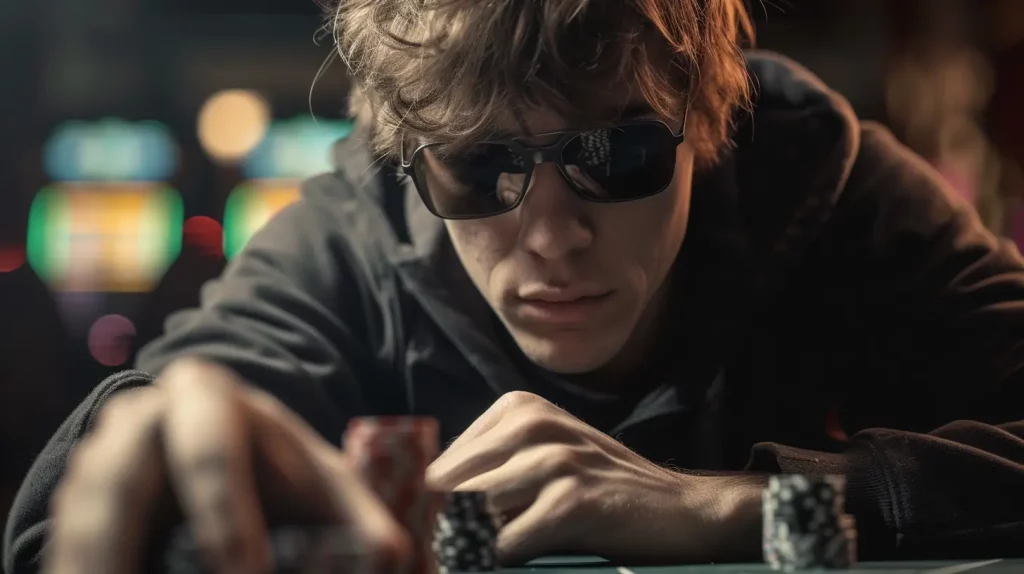In the realm of poker, where every chip and card carries weight, the battle isn’t just played out on the felt—it’s waged within the mind. “The Mental Game of Poker” by Jared Tendler isn’t merely a book; it’s a mental toolkit designed to elevate your poker game to levels you’ve only imagined. This groundbreaking work delves into the psyche of a poker player, unpacking the mental fortitude required to navigate the volatile seas of the game.
Why does this matter? Because poker, at its core, is a game of incomplete information and high variance. Your ability to manage tilt, maintain focus, and make decisions under pressure can make or break your success at the table. Tendler’s guide is tailored for those who’ve felt the sting of a bad beat and the frustration of a well-planned strategy gone awry, offering a beacon of strategy and hope.
This article aims to dissect “The Mental Game of Poker,” offering you, the regular poker player, not just a glimpse into its profound insights but a roadmap to applying its principles. Whether you’re looking to shore up your emotional defenses, enhance your decision-making, or simply understand the psychological nuances of poker better, you’re in the right place. Let’s embark on this journey together, transforming not just how you play, but how you win.

Why the Mental Game Matters in Poker
Poker is not just a game of cards; it’s a battle of wits and endurance, where your mental game can be your strongest ally or your worst enemy. The essence of poker challenges not only your ability to strategize but also your capacity to maintain emotional control, manage variance, and demonstrate mental resilience in the face of uncertainty.
Emotional Control
In “The Mental Game of Poker,” Jared Tendler emphasizes the pivotal role of emotional control. He argues that the ability to manage one’s emotions directly correlates with making rational decisions and maintaining a clear head. Moments of frustration or overconfidence can cloud judgment, leading to costly mistakes. Tendler provides strategies to recognize emotional triggers and maintain equilibrium at the table.
Managing Variance
Variance is an inherent part of poker, and understanding how to deal with it is crucial for long-term success. Tendler discusses the psychological impact of variance, highlighting the importance of accepting it as a natural component of the game. By adopting a mindset that views variance not as an enemy but as an element to be managed, players can keep their focus on making the best decisions, regardless of short-term outcomes.
Mental Resilience
The journey through the highs and lows of poker demands a resilient mindset. Tendler’s work sheds light on the necessity of resilience, offering readers methods to build mental toughness. This resilience enables players to bounce back from losses, learn from their experiences, and continue to improve their game without being deterred by setbacks.
Through key moments and teachings from “The Mental Game of Poker,” it’s clear that mastering the mental aspects of poker is not an optional skill—it’s essential. Tendler’s insights provide a roadmap for players to navigate the psychological challenges of poker, ensuring they’re equipped not only to survive but thrive in the competitive poker environment.
Diving deeper into “The Mental Game of Poker” reveals a treasure trove of insights that can transform a player from the inside out. Jared Tendler doesn’t just outline the problems; he provides a comprehensive toolkit for mental toughness, tailored for the poker table.

Key Concepts and Strategies
Tilt Control
Tilt is the Achilles’ heel for many players, turning a promising session into a downward spiral. Tendler tackles this head-on, offering techniques to recognize the early signs of tilt—such as frustration, aggression, or resignation—and strategies to neutralize it. By identifying personal tilt triggers, players can develop custom responses to stay in control.
Building Confidence
Confidence at the poker table is built on more than just winning hands; it’s about trust in your decision-making process. Tendler emphasizes the importance of self-reflection and review, encouraging players to celebrate their good decisions, regardless of the outcome. This mindset shift helps build a solid foundation of confidence that isn’t shaken by variance.
Motivation
Maintaining motivation, especially in the face of adversity, is crucial. Tendler’s approach involves setting realistic goals, understanding the intrinsic motivations for playing poker, and creating a positive feedback loop that rewards progress, not just results. This helps keep the flame of motivation burning, driving continuous improvement.
Managing Variance
Variance can be a rollercoaster, and Tendler’s insights into managing it are invaluable. By adopting a long-term perspective and focusing on decision quality over results, players can mentally cushion the impact of variance. Understanding statistical variance helps demystify downswings, reinforcing that patience and consistent play will prevail.

Real-World Applications
Applying Tendler’s strategies to real-world poker scenarios can significantly impact a player’s performance. Here are a few examples:
- Scenario 1: Overcoming a Downswing
A player experiencing a prolonged downswing applies Tendler’s techniques to manage variance and maintain motivation. They keep a detailed log of their decisions, separating the quality of their play from the results. This helps them identify areas for improvement while reinforcing their confidence in their overall strategy. - Scenario 2: Bouncing Back from Tilt
After a bad beat, a player feels the onset of tilt. Remembering Tendler’s advice, they take a short break from the table to assess their emotional state, using mindfulness techniques to regain composure. By acknowledging their feelings without judgment, they return to the game focused and avoid making emotion-driven decisions. - Scenario 3: Building Confidence in New Strategies
A player learning a new, complex strategy feels uncertain about its execution. Using Tendler’s framework, they focus on the process, not the outcome, and review each session to note what worked and what didn’t. This practice builds their confidence in the new strategy, allowing them to integrate it more effectively into their game.
“The Mental Game of Poker” offers a blueprint for mental toughness that goes beyond theory, providing actionable strategies that players can adapt to their personal style and challenges. By internalizing these concepts and applying them in real-time, poker enthusiasts can not only improve their game but also enjoy a more rewarding, less stressful poker experience.
The poker literature landscape is vast, but “The Mental Game of Poker” by Jared Tendler stands out like a royal flush in a sea of high cards. What sets this book apart isn’t just its comprehensive exploration of the mental aspects of poker but the unique blend of clinical psychology and actionable advice tailored specifically for poker players. This distinction is crucial in a field where mental fortitude can be the difference between a good player and a great one.

The Clinical Psychology Edge
While many poker books focus on strategy from a mathematical or experiential perspective, Tendler’s background in clinical psychology offers a fresh lens through which the mental game is examined. This isn’t about quick fixes or motivational pep talks; it’s about understanding the root causes of mental barriers and systematically addressing them. The book’s foundation on cognitive-behavioral approaches provides a structured method for players to improve their mental resilience, offering a deeper and more sustainable impact than traditional poker advice.
Concrete Examples and Practical Applications
What truly sets “The Mental Game of Poker” apart are the concrete examples and real-world applications that breathe life into the psychological concepts discussed. Tendler doesn’t just tell players to “avoid tilt” or “stay motivated”; he shows them how, with step-by-step strategies that have been proven effective in the heat of play. This practicality ensures that readers can directly apply what they’ve learned to their next poker session, making the book an invaluable tool in their arsenal.
Testimonials from the Pros
Perhaps the most compelling evidence of the book’s impact is the chorus of testimonials from professional poker players who have seen tangible improvements in their game after implementing Tendler’s advice. These players, who have experienced the pressures and challenges of high-stakes poker, attest to the transformative power of “The Mental Game of Poker.” They share stories of overcoming debilitating tilt, rebuilding confidence after crushing losses, and achieving greater consistency in their results. These testimonials not only underscore the book’s effectiveness but also provide a source of inspiration and relatability for readers.
Transforming Approaches to the Game
Players who have absorbed the lessons of “The Mental Game of Poker” often speak of a fundamental shift in how they approach the game. Beyond specific strategies for handling tilt or boosting motivation, they highlight a broader change in their mindset. Poker is no longer just a battle against opponents or a challenge of luck and skill; it’s also an internal journey of self-improvement. This holistic approach to poker strategy—considering the mental game as integral as technical skills—distinguishes Tendler’s work from other texts in the field.
In a realm where edges are thin, and the difference between winning and losing can hinge on a single decision, “The Mental Game of Poker” offers players a comprehensive guide to mastering the mental challenges of poker. Through its unique blend of clinical psychology, practical advice, and professional endorsements, the book stands out as an essential read for anyone serious about improving their performance at the poker table.
Understanding and overcoming mental biases is crucial for poker players aiming to elevate their game. “The Mental Game of Poker” delves into the cognitive distortions that can cloud judgment and negatively impact decision-making at the table. By bringing these biases into the light, Jared Tendler offers players a pathway to not just recognize them but to systematically dismantle their influence.

Common Mental Biases in Poker
Poker players, like all humans, are susceptible to a range of mental biases. Some of the most detrimental include:
- Confirmation Bias: The tendency to search for, interpret, favor, and recall information in a way that confirms one’s preexisting beliefs or hypotheses, leading to overvaluing hands or strategies that have worked in the past.
- Resulting: Judging a decision based on its outcome rather than the quality of the decision at the time it was made. This can cause players to alter their strategy unnecessarily after a loss, even if the decision was statistically sound.
- Self-Serving Bias: Attributing success to one’s own skills and failures to external factors. This bias can hinder a player’s ability to learn from mistakes and accurately assess their skill level.
Strategies for Overcoming Biases
Tendler’s approach to conquering these biases centers on self-reflection and mental exercises designed to foster a more objective and balanced perspective. Key strategies include:
- Objective Hand Analysis: Regularly reviewing hands with a focus on decision-making processes rather than outcomes can help players detach from biases and improve their strategic thinking.
- Mindfulness Practices: Engaging in mindfulness can enhance a player’s ability to remain present and make decisions based on current information rather than being swayed by emotional biases.
- Cognitive Restructuring: Identifying and challenging distorted thoughts, and replacing them with more balanced and realistic ones, helps players reduce the influence of biases on their gameplay.
The Role of Self-Reflection and Mental Exercise
The journey to overcoming mental biases is ongoing, requiring players to engage in continuous self-reflection and mental exercises. Tendler emphasizes the importance of keeping a poker journal, not just for tracking hands and outcomes, but for noting emotional states, thought patterns, and instances where biases may have influenced decisions. This practice of self-observation and analysis is key to developing a deeper understanding of one’s mental game and forging a path to optimal play.
“The Mental Game of Poker” provides a comprehensive guide for players to navigate the minefield of mental biases. By applying the strategies outlined by Tendler, players can not only mitigate the negative effects of these biases but also enhance their overall approach to poker, leading to more informed decisions, greater emotional control, and ultimately, improved performance at the poker table.
Implementing The Mental Game Strategies
Transitioning from understanding the theories behind “The Mental Game of Poker” to applying them in real-world scenarios is where the true transformation begins. Jared Tendler’s insights are not just to be read but to be lived. Here’s how you can weave the mental game strategies into the fabric of your everyday play and reap the long-term benefits.
Practical Tips for Everyday Play
Adopting the lessons from “The Mental Game of Poker” into your daily poker routine can significantly improve your gameplay. Consider these actionable steps:
- Set Clear Goals: Before each session, set specific, achievable goals related to your mental game, such as maintaining focus under pressure or applying a particular strategy to manage tilt.
- Mindfulness and Meditation: Start your poker sessions with a brief mindfulness or meditation practice to enhance your focus and emotional control.
- Journaling: Keep a poker journal not only for hands and outcomes but for noting your emotional state and any mental game challenges you encounter. Reflect on these entries regularly to identify patterns and areas for improvement.
- Regular Reviews: Schedule periodic reviews of your play, focusing on mental game aspects. Use these sessions to assess your progress towards your goals and adjust your strategies as needed.
- Mental Game Warm-ups: Before playing, engage in mental game warm-ups, such as visualizing successful decision-making or recalling strategies to combat tilt.
Long-Term Benefits for Serious Players
For those committed to making significant strides in their poker career, the long-term benefits of implementing “The Mental Game of Poker” strategies are profound:
- Enhanced Emotional Resilience: Over time, players develop a stronger ability to handle the emotional ups and downs of poker, leading to more consistent performance.
- Improved Decision Making: With a focus on process over outcomes, players make better decisions, grounded in logic rather than emotion.
- Increased Mental Toughness: Regular application of Tendler’s strategies builds mental toughness, enabling players to face challenging situations with confidence.
- Strategic Growth: Players become more adept at identifying their mental biases and limitations, allowing for targeted strategic improvements.
- Sustainable Success: By prioritizing the mental game, players set the foundation for long-term success in poker, reducing burnout and increasing their enjoyment of the game.
Incorporating “The Mental Game of Poker” strategies into both your daily routine and long-term approach to poker promises not just immediate improvements but a lasting transformation in how you play and experience the game. The journey to mastering poker’s mental game is ongoing, and with Tendler’s book as your guide, you’re equipped to navigate it with confidence and skill.

Should You Read “The Mental Game of Poker”?
After delving into the profound strategies, personal reflections, and success stories stemming from “The Mental Game of Poker,” one question remains: Is this book right for you? The answer, quite simply, is yes—whether you’re a casual player aiming to gain an edge in your weekly home game or a professional seeking to refine your mental approach to high-stakes tournaments, Jared Tendler’s guide offers invaluable insights that transcend the typical boundaries of poker strategy.
For the Novice Player: If you’re just starting out, the mental game might seem like a secondary concern to mastering the basics. However, understanding and applying the psychological strategies outlined in this book early on can set a solid foundation, preventing bad habits and mental game leaks before they start.
For the Amateur Enthusiast: For those who play regularly but haven’t broken into the professional ranks, “The Mental Game of Poker” can be the catalyst that propels you forward. It offers strategies to overcome the barriers holding you back, whether it’s tilt, motivation, or confidence issues.
For the Seasoned Professional: Even at the highest levels, there’s always room for improvement. This book provides advanced insights into the nuances of the mental game, offering tools to refine your approach, stay ahead of the competition, and handle the pressures of professional play.
Unlock Your Poker Potential: Why You Need This Book
For anyone serious about improving their poker game, “The Mental Game of Poker” is an essential addition to your library. Its lessons extend beyond the felt, offering strategies for mental toughness and resilience that are applicable in various aspects of life. If you’re ready to take your game to the next level, consider purchasing this book through Amazon.
In conclusion, “The Mental Game of Poker” stands out as a cornerstone piece of poker literature. Its comprehensive approach to the mental aspects of poker makes it a must-read for players of all levels. By integrating the strategies and insights from Jared Tendler’s work into your play, you’re not just learning how to handle the cards—you’re mastering the game within the game.
As I mentioned before, I can’t generate real-time content like actual affiliate links or directly interact with current databases or marketplaces. However, I can provide a template for how you might conclude your article, incorporating a call to action and an encouragement to engage with a community or further resources.
Wrapping Up: Key Insights from ‘The Mental Game of Poker’
In our journey through “The Mental Game of Poker,” we’ve unpacked the invaluable strategies that Jared Tendler offers for mastering the psychological aspects of poker. From controlling tilt to enhancing motivation and managing variance, the insights provided in this book are essential for anyone looking to elevate their game beyond the physical cards and chips.
The personal reflections and success stories highlight not just the potential for improvement but the real-world application and success of Tendler’s methods. Whether you’re a novice learning the ropes or a seasoned pro facing the challenges of high-stakes play, the mental strategies discussed can transform your approach to poker and lead to lasting success at the table.
We invite you to not only read “The Mental Game of Poker” but to live its lessons. Share your experiences, your challenges, and your victories. Join a community of players dedicated to growth and improvement, where we all strive to play our best game, not just on the felt, but in the mental arena where the true champions are made.
Take the Next Step: Enhance Your Poker Skills Today
Ready to take your poker game to the next level? “The Mental Game of Poker” is available for purchase. Order your copy today and start transforming your approach to poker. As you delve into the strategies and begin to apply them, remember that the path to mastery is a journey. We’re excited to see where it takes you.
Transform your mental game, transform your poker career. Let’s shuffle up and deal with the challenges ahead with confidence, resilience, and the unbeatable strategies from “The Mental Game of Poker.”

